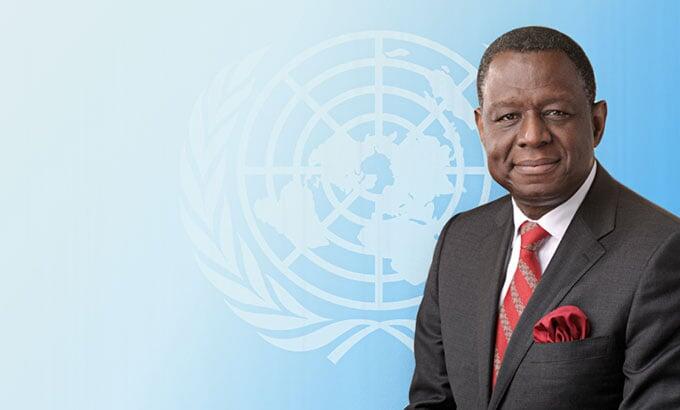Giving birth is typically the most joyful moment in a woman’s life. Yet this very process takes the life of so many women worldwide. Every day, some 800 women die in pregnancy or childbirth from complications that are very often preventable. And for every woman who dies, around 20 more suffer debilitating childbirth injuries, such as obstetric fistula. We already have an international consensus on how to address that. All we need now are resources and accelerated and sustained action.
Working for the survival and the well-being of women and girls is a human right imperative. And in order to take advantage of women’s full potential in the development of their nations, they must be able to plan their lives and families. This is why the international community is determined to make universal access to reproductive health a priority.
Today, as we commemorate World Population Day, it is time to re-energize our commitment to universal access to reproductive health services, especially voluntary family planning. This commitment is as relevant today as it was when world leaders first made it at the 1994 International Conference on Population and Development in Cairo.
Family planning is a basic human right. However, it remains meaningless unless individuals and couples have access to contraceptives, information and services to enable them to exercise that right.
We have to meet the needs of the 222 million women who want to delay or avoid pregnancy but have no access to modern contraceptives. This would help prevent 21 million unplanned births. It would also help prevent 79,000 maternal deaths and 1.1 million infant deaths.
We also have to address the special needs of young people, particularly adolescent girls. Today, pregnancy and childbirth-related complications are the major cause of death among girls 10 to 19 years old in most developing countries, while the highest rates of sexually transmitted infections are among young people aged 15 to 24. The needs and human rights of these young people must be urgently addressed.
On this World Population Day, UNFPA reaffirms its commitment to work with all of its partners to ensure that universal access to sexual and reproductive health, especially voluntary family planning, is recognized as a key element of the new international development agenda after 2015, and of all development and poverty reduction plans and policies.
Only then would countries be able to reduce poverty and social and economic inequality, improve the well-being of their people and safeguard the health and rights of women, men, and young people.
UNFPA, the United Nations Population Fund, is an international development agency that promotes the right of every woman, man and child to enjoy a life of health and equal opportunity. UNFPA supports countries in using population data for policies and programmes to reduce poverty and to ensure that every pregnancy is wanted, every birth is safe, every young person is free of HIV/AIDS, and every girl and woman is treated with dignity and respect.
See also:
Unmet need for contraception rises in sub-Saharan Africa Latest statistics on the number of women with an unmet need for modern contraception in sub-Saharan Africa.
Facebook: UNFPA Africa
Twitter: UNFPA_ARO
For information, please contact:
- Adebayo Fayoyin, Regional Communications Adviser, UNFPA, Sub-Regional Office Johannesburg
Tel: +27 11 603 5348; Cell: +27 79 517 0320; Fax: +27 11 603 5382; fayoyin@unfpa.org - Hughes Kone, Regional Communication Adviser, UNFPA UNFPA, Sub-Regional Office Dakar
Tel: +27 11 603 5348; Cell: +27 79 517 0320; Fax: +27 11 603 5382; kone@unfpa.org - Lindsay Barnes, Regional Communications Analyst, UNFPA, Sub-Regional Office Johannesburg
Tel: +27 11 603 5329; Fax: +27 11 603 5382; barnes@unfpa.org
Technical Advisers available for media interviews:
- Dr. Akinyele Dairo, Technical Adviser, Reproductive Health/Maternal Health, UNFPA, Sub-Regional Office Johannesburg; Tel: +27 11 603 5320; Cell: +27 82 382 2552; Fax: +27 11 603 5380; dairo@unfpa.org
- Dr. Gifty Addico, Technical Adviser, Reproductive Health & Commodities Security, UNFPA, Sub-Regional Office Johannesburg; Tel: +27 11 603 5356; Cell: +27 82 740 3872; Fax: +27 11 603 5380; gaddico@unfpa.org


